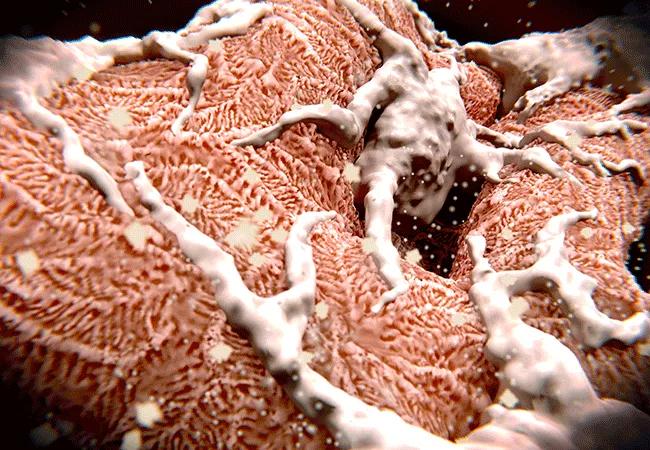A closer look at gene-environment dynamics in APOL1 variants

In a new study published in PLOS One, Leslie Bruggeman, PhD, staff, Department of Inflammation & Immunity, and her collaborators — including John O’Toole, MD, and John Sedor, MD —investigated how APOL1 gene variants in the context of an environmental stressor may cause chronic kidney diseases (CKD).
Advertisement
Cleveland Clinic is a non-profit academic medical center. Advertising on our site helps support our mission. We do not endorse non-Cleveland Clinic products or services. Policy
In general, most diseases have both genetic and environmental risk components. While all people have the same set of genes, not everyone has the same versions of each gene, called allelic variants. When a person is exposed to environmental stress — including specific diets, occupational hazards or viruses — this genetic variation can be the difference between whether he or she will go on to develop a specific disease or remain healthy.
“The association between allelic variants in the APOL1 gene and risk for CKD is a particularly fascinating story about gene-environment dynamics,” noted Dr. Bruggeman.
Variants in the APOL1 gene are associated with significant risk for some forms of CKD, including hypertension-attributed CKD and HIV-associated nephropathy (HIVAN). Interestingly though, these variants evolved to be beneficial, strengthening the immune system’s ability to fight parasitic infections. While inheritance of one variant APOL1 allele confers this robust immune defense, inheritance of two allelic variants protects against parasitic infection but also increases risk for CKD.
In order to study the interactions of genetic and environmental risk factors and how they may give rise to CKD, the team engineered a preclinical model of HIVAN that also expressed APOL1.
Previous research has shown that the presence of a risk gene and HIV infection of podocytes (a type of kidney cell) is required for the development of HIVAN. Given these known genetic and environmental risk factors and Dr. Bruggeman’s expertise in HIVAN, she said, “it was the perfect model to study on a pathological level how APOL1 variants and environmental stress converge to cause CKD.”
Advertisement
The researchers analyzed gene expression patterns, survival, kidney pathology and function, and podocyte number between HIVAN models expressing either the non-disease (“normal”) APOL1 variant or a CKD-associated variant.
They found that in the setting of the HIV stressor, expression of the “normal” variant was associated with reduced HIVAN pathology, preserved numbers of podocytes and increased podocyte hypertrophy—a helpful stress response. Conversely, kidney and podocyte pathology were observed to be the same between models that expressed the CKD-associated variant and genetic controls (APOL1 null).
These findings suggest that in the context of an environmental stressor, the “normal” APOL1 variant provides protection against podocyte loss or injury, and that the CKD-associated variants may contribute to disease because they lack this protective mechanism, a loss-of-function event.
“Another important outcome of our study is that it revealed for the first time what effect ‘normal’ APOL1 function has on podocytes — preserving podocyte numbers during disease stress,” noted Dr. Bruggeman. “We are continuing our studies to better understand these findings and how they fit with observations reported in other forms of APOL1-associated CKD. We still do not understand the whole picture — both in terms of the normal function of APOL1 and changes associated with the risk variants.”
“But,” she continued, “our team is optimistic that the insights we have garnered by studying HIVAN — and how genetic and environmental factors work together — can be more broadly applied to other causes of CKD associated with an APOL1 risk genotype.”
Advertisement
Dr. Bruggeman and her study collaborators Drs. O’Toole and Sedor are a leading triumvirate in kidney disease research at Cleveland Clinic. Drs. O’Toole and Sedor are both practicing nephrologists with clinical expertise (in genetics and large clinical trials, respectively) complementary to Dr. Bruggeman’s expertise in basic research, which has helped to position their program as a unique translational research initiative.
Drs. O’Toole and Sedor are currently working with transplant nephrologist Emilio Poggio, MD, to lead the Cleveland Clinic arm of the Kidney Precision Medicine Project, a major initiative of the National Institute of Diabetes and Digestive and Kidney Diseases (part of the National Institutes of Health), which also funds studies on APOL1 and kidney disease. They are both staff in the Department of Nephrology and Hypertension (Glickman Urological & Kidney Institute), and have joint appointments in the Department of Inflammation & Immunity.
Note: This article was originally published by Lerner Research Institute.
Advertisement
Advertisement

Pediatric urologists lead quality improvement initiative, author systemwide guideline

Fixed-dose single-pill combinations and future therapies

Reproductive urologists publish a contemporary review to guide practice

Two recent cases show favorable pain and cosmesis outcomes

Meta-analysis assesses outcomes in adolescent age vs. mid-adulthood

Proteinuria reduction remains the most important treatment target.

IgA nephropathy is a relatively common autoimmune glomerular disease that can be diagnosed only by biopsy

Oncologic and functional outcomes are promising, but selection is key